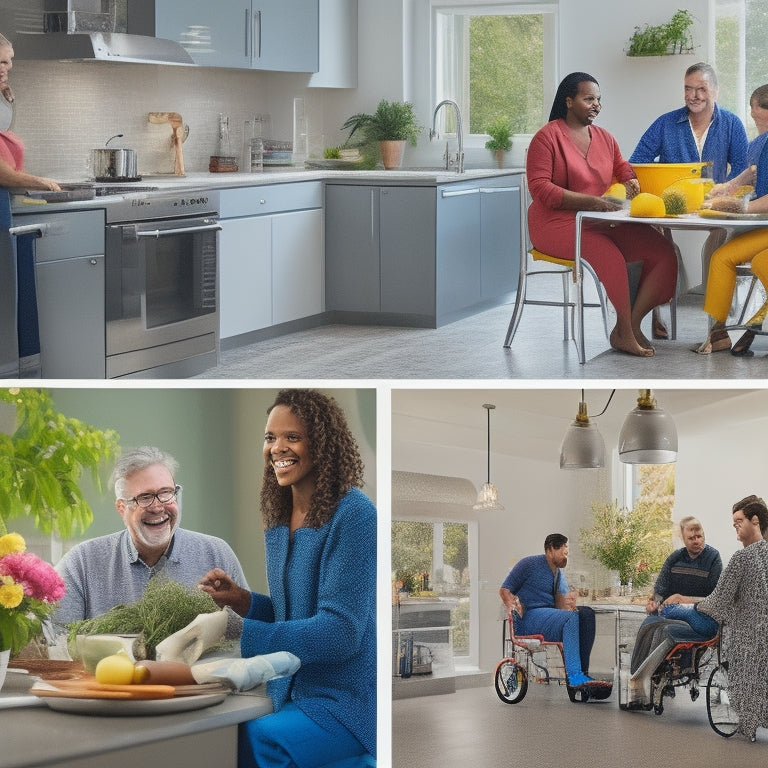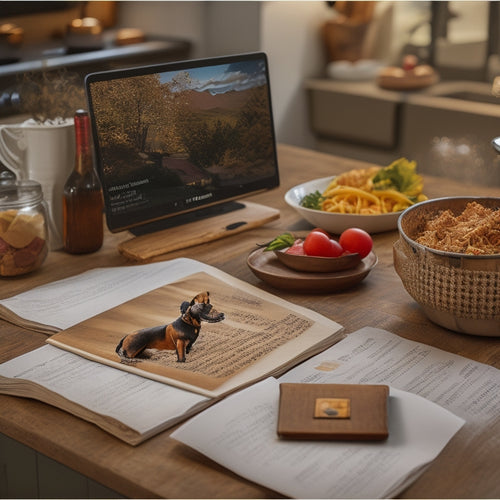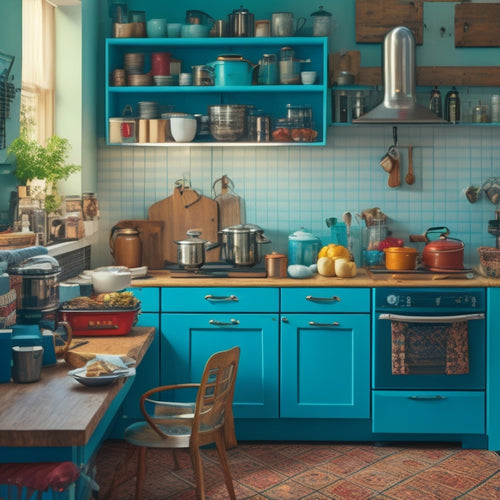
Accessible Kitchen Cleaning Courses for All Abilities
Share
You're seeking a kitchen cleaning program that accommodates your individual requirements and skills. You'll come across online materials that instruct you on the basics of kitchen cleaning, from tidying up and disinfecting to meal preparation and organization tricks. These courses integrate disability-friendly methods, flexible timetables, and accessible tools to make certain you can clean securely and effectively. You'll even unearth cleaning suggestions specifically crafted for individuals with mobility challenges, and grasp how to divide tasks to lessen the sense of being overwhelmed. As you delve into these materials, you'll reveal a customized approach to kitchen cleaning that enables you to take charge of your surroundings.
Key Takeaways
• Learn adaptable cleaning strategies to prioritize tasks, organize supplies, and create customized routines for efficiency and accessibility.
• Discover disability-friendly cleaning techniques, including inclusive methods and adaptive tools, to empower individuals with diverse needs.
• Master basics of kitchen cleaning with online courses, including decluttering, sanitizing, and meal prep tips for a safe and healthy environment.
• Explore accessible kitchen tools and equipment, such as adapted utensils, to simplify tasks and optimize the cleaning process.
• Develop a personalized cleaning routine that considers individual needs, abilities, and limitations to maintain a clean and organized kitchen.
Online Kitchen Cleaning Essentials
You can master the basics of kitchen cleaning from the comfort of your own home with online courses that teach you essential skills, from decluttering countertops to sanitizing sinks. These courses offer the flexibility to learn at your own pace, whenever and wherever you want.
With virtual kitchen tours, you'll get a close-up look at how to optimize your kitchen space and reduce clutter. You'll also discover cleaning product recommendations that are effective and eco-friendly.
Moreover, online courses provide valuable meal prep tips to help you save time and reduce waste. Organization hacks will show you how to maximize your storage space and keep your kitchen countertops clutter-free.
By the end of the course, you'll have the confidence to tackle even the toughest kitchen messes. With online kitchen cleaning essentials, you're in control of your learning journey. You'll be empowered to create a kitchen that's not only clean but also functional and efficient.
Disability-Friendly Cleaning Techniques
In recognition of the unique challenges faced by individuals with disabilities, kitchen cleaning courses now incorporate adaptive techniques that cater to diverse needs, empowering everyone to maintain a clean and organized kitchen space.
You'll learn inclusive cleaning methods that accommodate physical, sensory, or cognitive disabilities, ensuring you can clean safely and effectively. For instance, you'll discover disability-friendly cleaning tips like using ergonomic cleaning tools with comfortable grips, or adapting your cleaning routine to accommodate fatigue or pain.
You'll also learn how to create a personalized cleaning schedule that suits your energy levels and abilities. These techniques will enable you to take control of your kitchen cleaning, regardless of your abilities.
Adaptable Cleaning Schedules
Creating a tailored cleaning schedule that flexes around your availability, energy levels, and personal needs is crucial to maintaining a clean and organized kitchen space that works for you. By acknowledging your limitations and strengths, you can create customized routines that make the most of your time and energy.
Here are some tips to help you create an adaptable cleaning schedule:
-
Prioritize tasks: Identify the most crucial tasks that need to be done daily, weekly, and monthly, and allocate your energy accordingly.
-
Organize your cleaning supplies: Keep your cleaning supplies in an accessible and organized manner, so you can quickly grab what you need when you need it.
-
Be flexible: Don't be too hard on yourself if you can't stick to your schedule perfectly. Life is unpredictable, and it's vital to adapt to changes as needed.
Accessible Kitchen Tools Training
Having a tailored cleaning schedule in place, you can now focus on building your skills with accessible kitchen tools that make cleaning and organization a breeze.
It's time to explore adapted utensils designed to simplify tasks and reduce strain on your body. From ergonomic grips to angled handles, these innovative tools empower you to take control of your kitchen.
In our Accessible Kitchen Tools Training, you'll learn inclusive techniques to master these tools and maximize your efficiency.
Discover how to optimize your cleaning process with adaptive equipment, such as one-handed mops or lightweight vacuum cleaners. We'll show you how to choose the right tools for your specific needs and abilities, ensuring you can tackle even the most challenging tasks with confidence.
Cleaning for People With Mobility Issues
You face unique challenges when cleaning with mobility issues, but with the right strategies and tools, you can maintain a clean and comfortable living space despite physical limitations. Adapting your cleaning routine to your needs is crucial, and that's where adaptive cleaning methods come in. These methods focus on reducing strain and discomfort, allowing you to clean efficiently without worsening your mobility issues.
Some helpful strategies include:
-
Using mobility aids like walkers, canes, or wheelchairs to assist with movement and balance
-
Investing in inclusive cleaning products with ergonomic handles and lightweight designs
-
Implementing assistive technology, such as automated cleaning devices or voice-controlled appliances, to reduce physical effort
Sensory-Friendly Kitchen Environments
Sixty-five percent of people with sensory sensitivities experience anxiety in traditional kitchen environments, but by incorporating sensory-friendly design elements, you can craft a calming space that accommodates your unique needs.
Start by selecting adaptive cleaning methods that work for you, such as using gentle, fragrance-free products or opting for quiet, low-vibration appliances. Inclusive kitchen design can also make a huge difference, like installing soft, warm lighting or using non-reflective surfaces to reduce visual overwhelm.
To create a sensory-friendly kitchen, prioritize accessibility in cooking by choosing utensils and tools with comfortable grips and intuitive designs. You can also implement sensory-friendly cleaning tips, such as breaking down tasks into smaller, manageable chunks or using a 'one-touch' rule to minimize clutter and mess.
Cognitive Accessibility in Cleaning
Streamline your cleaning routine by breaking down complex tasks into simple, step-by-step processes that work with your cognitive abilities, not against them. This approach will give you cognitive empowerment and boost your cleaning confidence.
By adapting your cleaning strategy to your individual needs, you'll feel more in control and capable of tackling even the most challenging tasks.
Here are some inclusive cleaning strategies to get you started:
-
Break tasks into smaller chunks: Divide larger tasks into smaller, manageable steps to reduce overwhelm and increase success.
-
Use visual aids and reminders: Create lists, charts, or calendars to help you stay on track and remember important cleaning tasks.
-
Create a routine and stick to it: Establish a consistent cleaning schedule to help you stay focused and build habits that support your cognitive abilities.
Kitchen Safety for All Abilities
By identifying and mitigating potential dangers in your kitchen, you can create a secure and accessible space that accommodates your unique needs and abilities. This is vital, as a safe kitchen environment is essential for independence and confidence while cooking and cleaning.
Start by evaluating your kitchen's layout and identifying potential tripping hazards, such as slippery floors or cluttered countertops. Make safety modifications like installing grab bars, non-slip mats, or adjustable shelving to guarantee easy access to essential items.
Implement inclusive practices like labeling utensils and appliances, or using color-coded systems to differentiate between similar items. Additionally, consider investing in adaptive equipment, such as ergonomic utensils or one-handed gadgets, to make cooking and cleaning more manageable.
Overcoming Cleaning Anxiety Online
Taking the first step towards tackling kitchen cleaning tasks can be challenging, especially when anxiety and self-doubt creep in, but online resources and courses can provide the necessary guidance and support to help you build confidence and develop effective cleaning strategies.
You're not alone in feeling anxious about cleaning. Many people struggle with it, but with the right tools and mindset, you can overcome your anxiety and become a cleaning pro.
Online courses and resources can help you:
- Identify and challenge negative thought patterns that hold you back from cleaning
- Break down cleaning tasks into manageable chunks, making them feel less intimidating
- Develop a cleaning routine that works for you and your unique needs
Frequently Asked Questions
Can I Take the Course if I Have No Prior Cleaning Experience?
You don't need prior cleaning experience to take the course; it's designed for beginners. You'll learn basic skills and practical techniques to confidently tackle kitchen cleaning tasks, regardless of your starting point.
Are the Courses Suitable for People With Mental Health Conditions?
As you navigate life's twists and turns, remember you're not alone. You'll find emotional support and learning techniques tailored to your needs, surrounded by an inclusive community that provides accommodations, empowering you to thrive.
Will I Receive a Certificate Upon Completing the Course?
When you complete the course, you'll receive a certificate, boosting your career advancement and showcasing your practical skills, giving you the confidence to take on new challenges and opportunities.
Can I Access the Course Materials if I Have a Slow Internet Connection?
Imagine being stuck in a digital desert, craving knowledge but hindered by slow internet. Fear not, you'll still access course materials through alternative formats, offline resources, and mobile compatibility, ensuring video streaming is smooth sailing.
Are There Opportunities for Feedback and Support During the Course?
You'll get the support you need through peer support, instructor guidance, virtual office hours, and a community forum, ensuring you stay on track and empowered to achieve your kitchen cleaning goals.
Related Posts
-

What's the Best Way to Store Recipes Online?
You're ready to ditch the recipe chaos and streamline your collection with a digital storage solution. The best way t...
-

Why Renters Need Creative Kitchen Storage Solutions
You're likely no stranger to the frustrating reality of limited kitchen storage, where every inch counts and clutter ...

